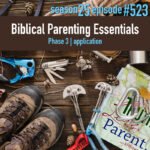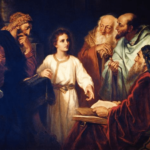[ad_1]
Have you ever asked a child what they learned in Sunday school, only to be met with a blank stare? Or maybe a shrug and, “I don’t know.”
You work hard to prepare for Sunday morning, and it can be so frustrating when kids don’t retain what you taught. That’s why one-point learning is so critical to Group’s philosophy!
What is one-point learning, and why does it work? Read on to find out, and get a free downloadable gift!
What Is One-Point Learning?
One-point learning means that a single, applicable truth from the Bible is repeated over and over throughout the lesson, explored in different ways, and cemented in kids’ minds. For example, kids might learn “The Bible is true.” Rather than learning several points about the Bible, like “The Bible is true,” “The Bible has 66 books,” and “The Bible is alive,” kids can go deep into the first point only—the one that’s the clearest and has the most application to their faith.
Sometimes kids may be assigned a response to the Bible point. In Group’s VBS and Simply Loved Sunday school curriculum, kids will respond with a simple phrase and motion each time they hear the point. This takes one-point learning even farther in helping kids remember the points. We’ve even heard of kids who attended a Group VBS repeating the points they learned months later when tough situations arose, and they needed to hold onto those truths.
So why does it work? Keep reading!
One-Point Learning Helps Kids Focus
It’s easy for us to think more is better. After all, we have so much we want kids to learn! Our time with them is short, and most kids don’t even come every week. So why not cram as much as possible into a lesson?
Consider your goal for ministry. Is it to expose kids to a ton of information, most of which they’ll forget? Or is it to draw them into a friendship with Jesus and help them see how God’s Word changes their lives? If it’s the latter, one-point learning helps them focus on the application for this week.
One-point learning tells kids, “This is the important part to remember.” It’s not the names of the disciples or which day God made trees. It’s that we can follow Jesus or that God is the Creator.
Consider what Jesus said in John 16:12: “There is so much more I want to tell you, but you can’t bear it now.” Jesus wasn’t about fire-hosing his disciples with all his wisdom and knowledge. He was about changing their lives. Let’s follow his example!
One-Point Learning Helps Kids Go Deeper
In Why Nobody Learns Much of Anything at Church: And How to Fix It, authors Thom and Joani Schultz discuss this fire-hose strategy. They suggest that “when we throw [kids] so many balls to juggle, they wind up dropping them all.”
The Schultzes believe that this “more, more, more” mentality “is based on the assumption that spraying our kids with more information will result in more learning. But there’s no evidence this is true. Ohio University education professor George Wood says, ‘Exposure does not equal learning. And exposure certainly does not equal retention. By having students cover even more material it virtually assures that nothing will be covered in depth. Students may become good Trivial Pursuit players, but they will be lousy citizens and neighbors.’”
One-point learning allows time for kids to explore more deeply, from different angles, and with different learning styles. Yes, time is short. So use it to go deep instead of wide.
Kids Can Remember One Single Point
At the beginning of this article, we discussed asking kids about what they learned in Sunday school. We invite you to try it!
One father said that when his daughters were young, he would sometimes take them to different churches. When he picked them up and asked them what they learned, he could tell whether the church used Group curriculum based on their answer.
If they used anything but Group, his daughters would give fact-based answers. “We learned about Noah.” “We learned about the Ten Commandments.”
If the church used Group curriculum, his daughters would give application-based answers. “We learned about trusting God.” “We learned about following God.”
And sometimes, kids who experience fact-driven lessons wouldn’t even be able to answer as specifically as those girls! The fact is, one-point learning means kids hear the same point over, and over, and over. And that repetition cements learning!
Not only do they hear that point, but they explore what it means practically in their lives. The time they spend exploring this point in practical ways means it’s more likely to stick in their memories!
One-Point Learning Helps Kids Store Simple Truths in Their Hearts
When Group created BE BOLD curriculum for preteens, we wrestled with how to handle Bible points for the lessons. BE BOLD is based on asking and exploring really hard questions, like “If God Loves the World, Why Does He Let Bad Stuff Happen?” “How Do I Stand Up to Satan?” “What Does the Bible Say About Suicide?”
These are not easy questions, and they don’t have easy answers. So we decided to use one-point learning even more repetitively. Throughout BE BOLD, there are only nine points. Nine points in 86 lessons! Why? Because we wanted to give kids simple truths to remember and hold onto even in the face of tough faith questions.
When you can’t understand why bad things happen, you can trust the truth that God is all-powerful. If you can’t make sense of suicide, you can trust that God is your friend. When you’re wondering if God is punishing you, you can trust that Jesus loves you.
And that’s the beauty of one-point learning. By giving kids memorable, simple truths as Bible Points to explore in depth, we’re giving them sound bites of truth to play in their heads when they need them most.
One-Point Learning Leads to Life Application
One key benefit of one-point learning is life-application. Hebrews 4:12 tells us, “For the word of God is alive and powerful. It is sharper than the sharpest two-edged sword, cutting between soul and spirit, between joint and marrow. It exposes our innermost thoughts and desires.” The Bible is powerful!
When we treat the Bible like a history book, or a checklist of rules, we might get the kids with outstanding memories to retain some of what we teach. But for what? The Pharisees knew the Bible inside and out. They obeyed its rules and then some. But they didn’t let it penetrate their hearts and expose their innermost thoughts and desires. It wasn’t a book that was alive and powerful to them—it was a to-do list.
Even if kids know the Bible, that doesn’t mean it will change their hearts. But one-point learning gives kids the chance to go deep enough into a point the Bible makes to explore how it applies to their lives. It gives them a chance to let God expose their innermost thoughts and desires through his Word. It allows them to consider how God is calling them to live out their faith.
Ask Me the Point Stickers
From the time Group launched it’s very first children’s curriculum, Hands-On Bible Curriculum, we have embraced this one-point learning theory. At times we’ve even included a sheet with each Hands-On Bible Curriculum kit with stickers that say, “Ask Me the Point.”
Kids could wear these as they left because we felt confident that if their parents asked them the point, they’d know what they learned that day on a deep, applicable level.
We still have that confidence in all our materials! That’s why we’re giving you your own printable sticker sheet to use with whatever curriculum you teach. Download them here! For a brighter and bolder look, print out the first page. If you’re wanting to keep the color printing job a little lighter, print the second page. Or you can mix and match stickers from both sheets! Print these stickers on Avery 5160 labels and give them to your kids to wear home each week. You’ll get families discussing faith in fresh new ways!
Looking for more teacher tips? Check out these articles!
© Group Publishing, Inc. All rights reserved. No unauthorized use or duplication permitted.
[ad_2]
Source link







You must be logged in to post a comment.